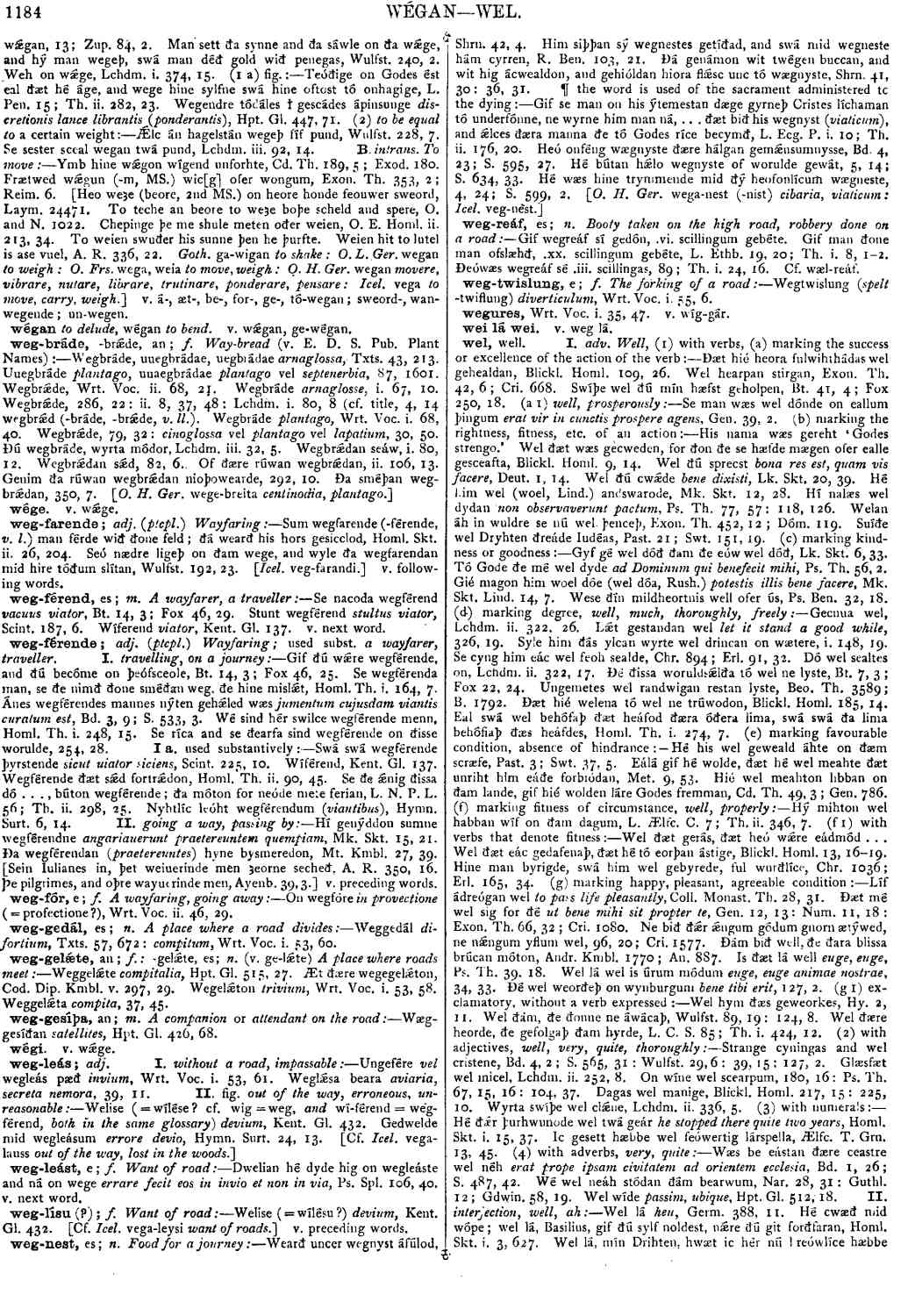wel
- adverb
- interjection
-
Ðæt hié heora fulwihthádas wel gehealdan,
- Blickl. Homl. 109, 26.
-
Wel hearpan stirgan,
- Exon. Th. 42, 6; Cri. 668.
-
Swíþe wel ðú mín hæfst geholpen, Bt. 41, 4 ; Fox 250, 18. (a 1) well, prosperously :-- Se man wæs wel dónde on eallum þingum
erat vir in cunctis prospere agens,
- Gen. 39, 2.
-
His nama wæs gereht ' Godes strengo. ' Wel ðæt wæs gecweden, for ðon ðe se hæfde mægen ofer ealle gesceafta,
- Blickl. Homl. 9, 14.
-
Wel ðú sprecst
bona res est, quam vis facere,
- Deut. 1. 14.
-
Wel ðú cwǽde
bene dixisti,
- Lk. Skt. 20, 39.
-
Há him wel (woel,
- Lind.) andswarode, Mk. Skt. 12, 28.
-
Hí nalæs wel dydan
non observaverunt pactum,
- Ps. Th. 77, 57: 118, 126.
-
Welan áh in wuldre se nú wel þenceþ,
- Exon. Th. 452, 12 ; Dóm. 119.
-
Suíðe wel Dryhten ðreáde Iudéas,
- Past. 21; Swt. 151, 19.
-
Gyf gé wel dóð ðam ðe eów wel dóð,
- Lk. Skt. 6, 33.
-
Tó Gode ðe mé wel dyde
ad Dominum qui benefecit mihi,
- Ps. Th. 56, 2.
-
Gié magon him woel dóe (wel dóa, Rush.)
potestis illis bene facere.
- Mk. Skt. Lind. 14, 7.
-
Wese ðín mildheortnis well ofer ús,
- Ps. Ben. 32, 18.
- 326, 19.
-
Hé his wel geweald áhte on ðæm scræfe,
- Past. 3; Swt. 37, 5.
-
Eálá gif hé wolde, ðæt hé wel meahte ðæt unriht him eáðe forbiódan,
- Met. 9, 53.
-
Hié wel meahton libban on ðam lande, gif hié wolden láre Godes fremman,
- Cd. Th. 49, 3 ; Gen. 786.
-
Hý mihton wel habban wíf on ðam dagum,
- L. Ælfc. C. 7; Th. ii. 346, 7. (f 1)
-
Hine man byrigde, swá him wel gebyrede, ful wurðlíce, Chr. 1036; Erl. 165, 34. (g) marking happy, pleasant, agreeable condition :-- Líf ádreógan wel
to pass life pleasantly,
- Coll. Monast. Th. 28, 31.
-
Ðæt mé wel sig for ðé
ut bene mihi sit propter te,
- Gen. 12, 13: Num. 11, 18 : Exon. Th. 66, 32 ; Cri. 1080.
-
Ne bið ðǽr ǽngum gódum gnorn ætýwed, ne nǽngum yflum wel,
- 96, 20; Cri. 1577.
-
Ðám bið well, ðe ðara blissa brúcan móton,
- Andr. Kmbl. 1770 ; An. 887.
-
Is ðæt lá well
euge, euge,
- Ps. Th. 39. 18.
-
Wel lá wel is úrum módum euge, euge animae nostrae, 34, 33. Ðé wel weorðeþ on wynburgum
bene tibi erit,
- 127, 2. (g 1)
-
Wel ðám, ðe ðonne ne áwácaþ,
- Wulfst. 89, 19 : 124, 8.
-
Wel ðære heorde, ðe gefolgaþ ðam hyrde,
- L. C. S. 85; Th. i. 424, 12.
-
Strange cyningas and wel cristene,
- Bd. 4, 2 ; S. 565, 31 : Wulfst. 29, 6 : 39, 15 : 127, 2.
-
Glæsfæt wel micel,
- Lchdm. ii. 252, 8.
-
On wíne wel scearpum,
- 180, 16: Ps. Th. 67, 15, 16 : 104, 37.
-
Dagas wel manige,
- Blickl. Homl. 217, 15 : 225, 10.
-
Wyrta swíþe wel clǽne,
- Lchdm. ii. 336, 5.
-
Hé ðær þurhwunode wel twá geár
he stopped there quite two years,
- Homl. Skt. i. 15, 37.
-
Ic gesett hæbbe wel feówertig lárspella,
- Ælfc. T. Grn. 13, 45:
- Hpt. Gl. 512, 18.
-
Wel lá
heu,
- Germ. 388, 11.
-
Hé cwæð mid wópe; wel lá,
Basilius, gif ðú sylf noldest, nǽre ðú git forðfaran. Homl. Skt. i. 3, 627. -
Wel lá, mín Drihten, hwæt ic hér nú hreówlíce hæbbegefaren,
- 23, 575.
-
Wel lá (cf. eálá, Bt. 4; Fox 8, 10), ðú éca sceppend ára monna cynne
O! jam respice teras,
- Met. 4, 29.
-
Wel lá, monna bearn,
- 21, 1.
-
Wel lá, men, wel,
- Bt. 34, 8; Fox 144, 23.
-
Wel gá
heia,
- Wrt. Voc. ii. 110, 30.
-
Weol gá, weol gá
euge, euge,
- Ps. Surt. 69, 4.
Bosworth, Joseph. “wel.” In An Anglo-Saxon Dictionary Online, edited by Thomas Northcote Toller, Christ Sean, and Ondřej Tichy. Prague: Faculty of Arts, Charles University, 2014. https://bosworthtoller.com/34988.
Checked: 0